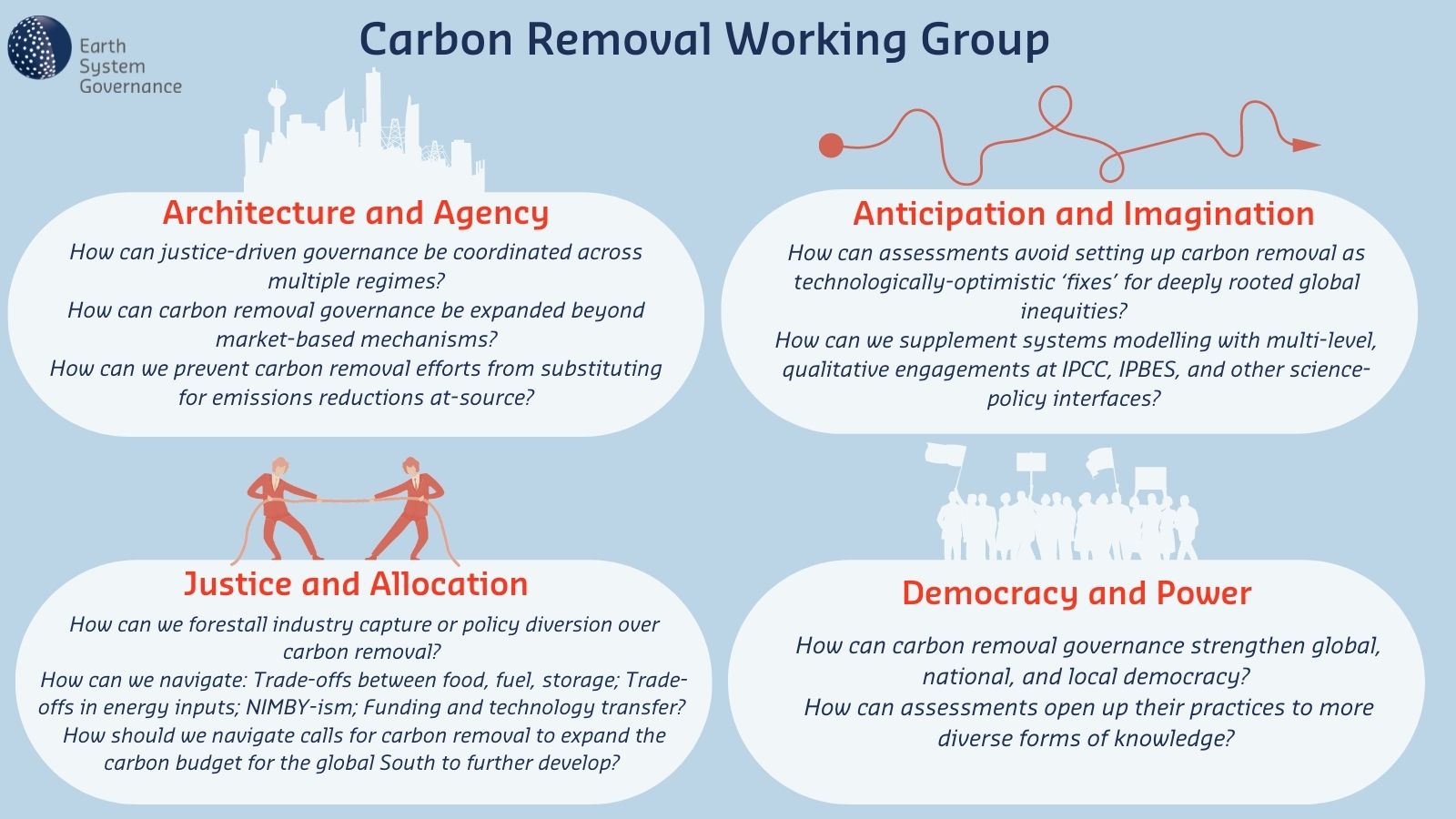Carbon removal presents a novel topic for the Earth System Governance community, as it could narrowly lock in incentives to delay decarbonization or offer opportunities to remake and catalyse climate governance efforts across multiple issues and regimes. We envision a ‘big tent’ approach to this topic that encompasses critical and policy-driven perspectives. How are carbon removal systems being set up as catalysts or distractions for just and effective climate, energy, biodiversity, and food governance? What are the key actors, discourses, and challenges? Can carbon removal be implemented and governed in a way that avoids new technofixes, and that confronts and repairs deep global inequities across the global North and South?
What carbon removal approaches are being considered?
The breadth of governance dimensions to be addressed reflects the diversity of proposed carbon removal approaches, and a global spectrum of stakeholders.
Forestry and agricultural management, from afforestation and reforestation to bioenergy production for carbon capture and storage, invoke trade-offs in land use between agriculture, fuel, and carbon storage – a particular nexus of poverty alleviation and food provision in the global South. To reverse previous trends towards monoculture plantations and land-grabs, the Glasgow COP26’s Leaders’ Declaration on Forests and Land Use renews focus on avoided deforestation – the preservation of bio-diverse carbon stocks, with co-benefits for ecosystems services to local, often indigenous populations.
Meanwhile, technological approaches like direct air capture call for a massive upscaling of energy inputs, storage reservoirs, and pipelines – but it is unclear whether these will rely on the stranded assets of the fossil fuel industry, or new renewable systems. Enhanced weathering could enhance agricultural production by reducing fertilizer reliance – but could lock in massive new shipping and dredging economies. Terrestrial approaches are even being transported into marine systems, with blue carbon (marine ecosystems restoration), ocean alkalinization (marine enhanced weathering), and marine biomass for carbon capture and storage.
Through the following lenses of the Earth System Governance project, some of the questions our Working Group focuses on include:
 Architecture and Agency:
Architecture and Agency:
- How can justice-driven governance be coordinated across multiple issues and regimes, accounting for links to biodiversity, food systems, energy access, marine pollution, and many others?
- How can carbon removal governance be expanded beyond carbon pricing, accounting, and offsets trading; and more generally, ‘ecological modernization’ (cost-effective, market-based environmental governance)?
- How can the Paris ‘playbook’ prevent carbon removal efforts from substituting for emissions reductions at-source, through the design of (separate) targets, incentives, and emissions baskets?
Democracy and Power:
- How can carbon removal governance be developed in a way that strengthens links between global, national, and local democracy?
- How can carbon removal governance navigate the tensions between democracy and sustainability – i.e., by developing more accountable and transparent state, non-state and hybrid governance arrangements?
- How can carbon removal assessments be democratized by opening up their practices to more diverse forms of knowledge?
Justice and Allocation:
- How can we forestall industry capture or policy diversion over carbon removal – via carbon colonialism by rich countries, companies, and even individuals?
- How can we navigate: Trade-offs in spatial use between food, fuel, storage; Trade-offs between the use of renewables for powering carbon removal or for other energy demands; NIMBY-ism and exporting (opposition to) carbon storage; Low technological capacity and funding and technology transfer?
- How should we navigate calls for carbon removal to expand the carbon budget for the global South to further develop?
Anticipation and Imagination:
- How can early scientific and industry assessments avoid setting up carbon removal approaches and strategies as technologically-optimistic ‘fixes’ for deeply rooted global inequities?
- How can new scenarios and pathways be developed for carbon removal that supplement systems modelling with multi-level, qualitative engagements that focus on lived experiences and local implications of ‘global cockpit’ strategies?
- How can these efforts move into established assessment processes at IPCC, IPBES, and other science-policy interfaces?
.
Contact information
Convenors
- Frank Biermann, Utrecht University
- Peter Dauvergne, University of British Columbia
Coordinators
- Sean Low, Aarhus University – sean.low@btech.au.dk
- Miranda Boettcher, German Institute for International and Security Affairs (SWP) – miranda.boettcher@swp-berlin.org


 Architecture and Agency:
Architecture and Agency: